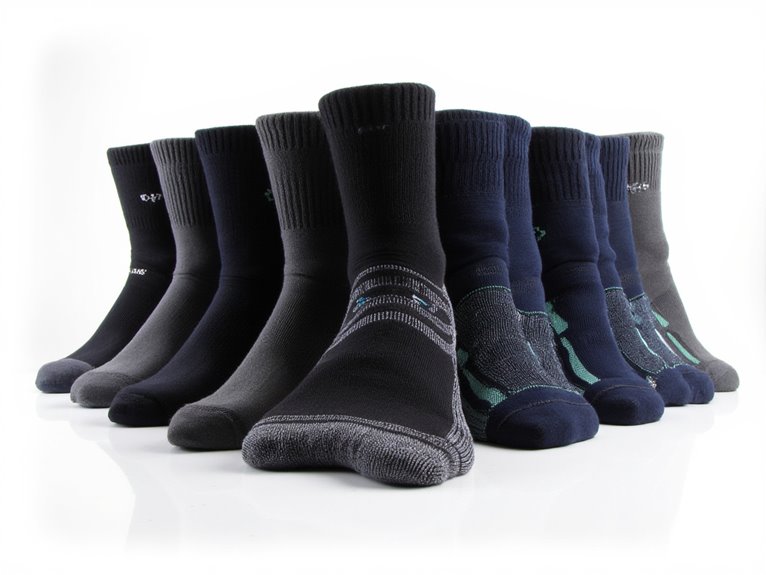How Nutrition and Hydration Affect Overnight Warmth
Your body’s overnight warmth depends on proper hydration and strategic nutrition that support temperature regulation. Adequate hydration maintains blood volume for efficient heat transport from your core to extremities, while dehydration reduces circulation and impairs sweating mechanisms. Key nutrients like magnesium stabilize body temperature, omega-3s support circadian alignment, and balanced electrolytes prevent vasoconstriction that blocks heat distribution. Understanding these interconnected systems reveals targeted strategies for optimizing your nighttime thermal comfort.
We are supported by our audience. When you purchase through links on our site, we may earn an affiliate commission, at no extra cost for you. Learn more. Last update on 20th January 2026 / Images from Amazon Product Advertising API.
Notable Insights
- Proper hydration maintains blood volume for efficient heat transport from core to extremities during sleep.
- Dehydration impairs sweating and reduces blood flow to hands and feet, causing core heat buildup.
- Magnesium and electrolytes regulate muscle relaxation and vascular function, supporting stable body temperature overnight.
- Nutrient deficiencies disrupt melatonin production, affecting the natural temperature drop needed for sleep onset.
- Electrolyte imbalances cause vasoconstriction and cardiovascular strain, compromising the body’s heat distribution capabilities.
The Science Behind Body Temperature Regulation During Sleep
Your body’s temperature regulation during sleep operates through a complex interplay of biological mechanisms that directly impact both sleep quality and overnight warmth.
Core temperature decreases 0.5°C to 1°C before sleep onset. This decline triggers sleep initiation through your hypothalamus.
Thermoregulatory mechanisms redistribute heat from your core to peripheral areas during sleep. Blood vessels dilate in your extremities, facilitating heat loss. Your metabolism simultaneously slows, reducing internal heat production.
Sleep stage variations create distinct temperature patterns. NREM sleep maintains consistent cooling through active vasodilation. REM sleep impairs temperature regulation entirely.
Your body becomes fundamentally poikilothermic during REM phases, relying on external conditions for thermal stability.
Circadian rhythms coordinate these temperature fluctuations with sleep-wake cycles. This natural cooling process is critical for restorative sleep and proper overnight thermal regulation.
Water’s Critical Role in Nighttime Thermoregulation
Your hydration status directly controls how effectively your body regulates temperature throughout the night.
When you’re properly hydrated, your blood volume remains high enough to transport heat efficiently from your core to your skin, where it can dissipate and trigger the temperature drop needed for quality sleep.
Dehydration disrupts this process by reducing blood flow to your extremities and impairing your sweating response, causing heat to build up in your core and making it harder to fall asleep or stay comfortable.
Hydration and Sleep Quality
While sleep appears to be a passive process, your body actively maintains complex physiological systems throughout the night, with hydration playing a central role in temperature regulation.
Water facilitates efficient blood circulation, enabling your body to dissipate heat and shift smoothly between sleep stages. The hydration benefits extend beyond basic comfort-adequate fluid levels prevent the fragmented sleep patterns associated with poor thermoregulation.
Current research reveals mixed findings regarding hydration’s impact on sleep quality:
- Polysomnography studies show minimal effects of mild dehydration on healthy young adults.
- Controlled trials comparing 1.25L versus 3L intake found no significant differences.
- Pilot data suggests potential effects on sleep efficiency and slow-wave sleep.
- Larger studies across diverse populations remain needed for definitive conclusions.
Proper hydration supports your body’s natural cooling mechanisms throughout sleep cycles.
Dehydration’s Temperature Impact
Understanding how hydration affects sleep quality reveals only part of the relationship between water intake and nighttime comfort. Dehydration effects extend far beyond simple thirst, fundamentally disrupting your body’s temperature regulation mechanisms. When you’re dehydrated, your sweating rate decreases considerably, reducing your primary cooling method. Your skin blood flow drops, limiting heat dissipation. These changes increase temperature sensitivity and make maintaining stable core temperature difficult.
| Dehydration Level | Sweating Capacity | Temperature Control |
|---|---|---|
| Mild (2% loss) | 15% reduction | Slightly impaired |
| Moderate (4% loss) | 30% reduction | Moderately impaired |
| Severe (6% loss) | 50% reduction | Considerably impaired |
| Critical (8% loss) | 70% reduction | Severely compromised |
| Dangerous (10% loss) | 85% reduction | Near complete failure |
Reduced blood volume from water loss strains your cardiovascular system, compromising circulation needed for heat distribution throughout your body.
Essential Nutrients That Impact Sleep Temperature
Several key nutrients directly influence your body’s ability to maintain ideal temperature during sleep while supporting the biological processes that regulate rest.
Specific nutrients work through targeted mechanisms to regulate your body’s thermal balance and support the biological processes essential for quality rest.
These compounds work through specific mechanisms to regulate thermal balance and circadian rhythms.
Four critical nutrients for sleep temperature regulation include:
- Magnesium – Regulates muscle relaxation and body temperature stabilization
- Omega-3 fatty acids – Support circadian alignment and serotonin production
- Tryptophan – Converts to melatonin for temperature-dependent sleep onset
- B vitamins – Control melatonin synthesis and metabolic heat production
Nutrient timing affects absorption rates and effectiveness.
Sleep supplements containing these compounds should be taken 30-60 minutes before bedtime for peak bioavailability.
Magnesium doses of 200-400mg prove most effective for temperature regulation, while omega-3 supplementation requires 1-2 grams daily for measurable circadian improvements.
How Dehydration Disrupts Your Body’s Natural Cooling System
When you’re dehydrated, your body can’t produce enough sweat to cool itself effectively during sleep.
Your blood volume drops considerably, reducing circulation to your skin where heat normally escapes through radiation and convection.
This creates a dangerous cycle where your body retains more heat while losing its primary mechanisms for temperature regulation.
Reduced Sweat Production
As water levels in your body drop below ideal thresholds, your natural cooling system begins to malfunction in predictable ways.
Dehydration directly compromises your sweat mechanisms by reducing blood flow to skin surfaces. Your body prioritizes essential organ function over temperature regulation when fluid reserves diminish.
The physiological breakdown occurs through these steps:
- Blood volume decreases – reducing circulation to sweat glands
- Skin blood flow drops – limiting heat transfer from core to surface
- Sweat rate declines – preventing effective evaporative cooling
- Heat storage increases – raising your core temperature dangerously
This cascade effect creates a dangerous feedback loop.
Your compromised cooling system can’t dissipate excess heat effectively. Proper hydration strategies must restore fluid balance before thermoregulatory failure occurs, making prevention absolutely critical for maintaining normal body temperature.
Impaired Blood Circulation
Beyond reduced sweating capacity, dehydration triggers a cascade of circulatory changes that fundamentally disrupts your body’s ability to distribute and regulate heat effectively. Hypovolemia reduces central venous pressure and cardiac output, limiting blood flow to peripheral tissues. Your skin receives decreased circulation, impairing vasodilation responses essential for heat transfer from core to environment.
| Circulation Effect | Dehydrated State |
|---|---|
| Skin Blood Flow | Reduced by 20-30% |
| Vasodilation Response | Noticeably impaired |
| Heat Transfer Capacity | Markedly decreased |
| Peripheral Warmth | Cold sensations increase |
| Core Temperature | Heat accumulation occurs |
Electrolyte imbalances from poor hydration levels alter vascular smooth muscle function, causing vasoconstriction. Your cardiovascular system experiences increased strain while attempting to maintain tissue perfusion. These circulatory disruptions create uneven thermal distribution, leading to peripheral cooling and compromised overnight warmth regulation.
Electrolyte Balance and Overnight Comfort
While maintaining proper hydration often receives attention for overnight comfort, your electrolyte balance plays an equally critical role in regulating warmth and sleep quality throughout the night.
Magnesium, potassium, and sodium conduct electrical impulses essential for nerve signal transmission and temperature regulation. Your hypothalamus relies on these minerals to maintain fluid homeostasis and control heat distribution during sleep.
Electrolyte imbalances disrupt muscle recovery and cause nocturnal cramping that interrupts rest.
Consider these key electrolyte sources for ideal overnight comfort:
- Magnesium reduces adrenaline levels and promotes nervous system relaxation.
- Potassium prevents muscle contractions and involuntary movements.
- Sodium maintains osmotic balance for temperature control.
- Calcium supports acid-base balance critical for neuron function.
Proper electrolyte levels enhance melatonin regulation, stabilize circadian rhythms, and prevent sleep fragmentation.
Optimal Hydration Strategies for Better Sleep Temperature Control
Your body’s hydration status directly determines how effectively you’ll regulate temperature during sleep, with even mild dehydration reducing your ability to cool down by up to 15%.
Proper hydration timing becomes vital for ideal sleep temperature control. You should consume 16-20 ounces of water 2-3 hours before bedtime to maintain adequate fluid levels without causing nighttime disruptions.
Your core temperature naturally drops 1-2 degrees Fahrenheit during sleep onset. Dehydration impairs this process by reducing blood volume and compromising your body’s cooling techniques through decreased sweat production.
Monitor your urine color throughout the day-pale yellow indicates proper hydration levels.
Incorporate hydrating foods like watermelon and cucumber into evening meals. These provide sustained hydration without excessive fluid intake.
Avoid alcohol and caffeine after 6 PM, as both substances increase fluid loss and disrupt temperature regulation mechanisms essential for quality sleep.




